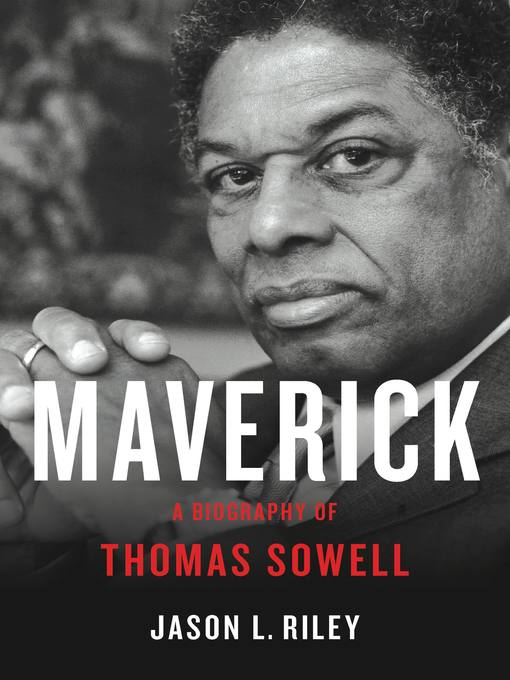
Maverick
A Biography of Thomas Sowell
کتاب های مرتبط
- اطلاعات
- نقد و بررسی
- دیدگاه کاربران
نقد و بررسی

March 29, 2021
Wall Street Journal columnist Riley (Please Stop Helping Us) explores the roots of conservative social theorist Thomas Sowell’s ideas on race, economics, and the “trade-offs between individual liberty and state intervention” in this flattering biography. Riley sketches how Sowell’s background as a Black orphan in 1930s North Carolina and a high school dropout who went on to earn advanced degrees from Harvard, Columbia, and the University of Chicago informed his opposition to affirmative action and his belief in the uplifting benefits of free market capitalism for African Americans and other minorities. There are some colorful details about Sowell’s early life (at a Bronx homeless shelter for boys, he “kept a knife under his pillow for protection”), but Riley mainly focuses on how Sowell’s “adherence to empiricism” led him to conclude that the welfare system “pay people to fail,” that sexism does not explain the gender pay gap, and that the “internal cultures” of ethnic groups play a bigger role than discrimination in determining how they fare in the U.S. Along the way, Riley takes potshots at liberal scholars, characterizing their disagreements with Sowell as unsupported by the data and based on willful misreadings of his arguments. Conservatives will cherish this one-sided hagiography; others need not apply.

April 1, 2021
An idea-centered life of the noted economist and political commentator. "I'm sure that at least 95% of the people in this country have never heard of me, and that's the way it should be." So remarked Thomas Sowell (b. 1930) in 2003. Readers of conservative/libertarian publications such as Reason and more liberal ones such as the New York Times will number among the other 5%, aware of Sowell through his prolific journalism. Wall Street Journal columnist Riley charts Sowell's perhaps unlikely path. From a modest background, he finished high school after serving in the Marine Corps, took advantage of the GI Bill to attend Howard University, then Harvard and Columbia, and finally earned a doctorate in economics from the University of Chicago. His politics began to change from a kind of Marxism to a qualified endorsement of Milton Friedman's free-market ideas. (Sowell allows government a greater role than Friedman in enhancing the public good.) From the vantage point of the Hoover Institution, he has written numerous controversial books and a mountain of newspaper commentaries that have hit the third rail plenty of times. As a Black public intellectual, he has opposed affirmative action and similar programs. "Sowell's scholarship would demonstrate empirically," Riley asserts, "that racial preferences for the black underclass were not only ineffective but counterproductive, that they stigmatized black achievement, and that they were no substitute for the development of skills, attitudes, and habits that are conducive to upward mobility." Perhaps unlikely friends such as Steven Pinker have suggested that Sowell's race has kept him from being recognized as a great economist, but regardless, he has always been interested in matters that embrace child development, public policy, and other extraeconomic topics. It is on Sowell's economics that Riley falls short: Sowell has said that his work on Say's law is among his most important accomplishments, but Say's law goes unglossed while the differences between the Chicago School and other economic schools of thought merit broader exploration. Though with some shortcomings, this will be valuable to students of economics, Black conservatism, and public policy.
COPYRIGHT(2021) Kirkus Reviews, ALL RIGHTS RESERVED.

April 2, 2021
The life of economist and public intellectual Thomas Sowell (b. 1930) is given consideration and nuance in this biography by Riley (senior fellow, Manhattan Inst.; Please Stop Helping Us). This contribution (which is the only full-scale treatment of Sowell aside from Riley's documentary Thomas Sowell: Common Sense in a Senseless World and Sowell's own autobiographical works) compares Sowell's creation of an ideational marketplace with those who considerably influenced him (Milton Friedman, George Stigler, Steven Pinker), those who arrived at similar ideas (Walter E. Williams, Shelby Steele, Stephen L. Carter, Glenn Loury, William Julius Wilson), and some of his current critics (Ibram X. Kendi, Ta-Nehisi Coates). In a clearly composed account, geared toward general readers, Riley describes Sowell's lengthy career characterized by his emphasizing the importance of incentives, institutions, self-improvement, geography, human capital, and trade-offs engendered by choices. Always assessing society through the eyes of an economist, Sowell (a former Marxist) has for decades espoused libertarian-conservative concepts of school choice, drug decriminalization, and opposition to affirmative action's unintended consequences. VERDICT Based on interviews and ideas replete in Sowell's innumerable books, this biography is seasoned with selections from the economist's sardonic quips. While many will disagree with his proposals, few should disregard his impact.--Frederick J. Augustyn Jr., Lib. of Congress, Washington, DC
Copyright 2021 Library Journal, LLC Used with permission.

























دیدگاه کاربران